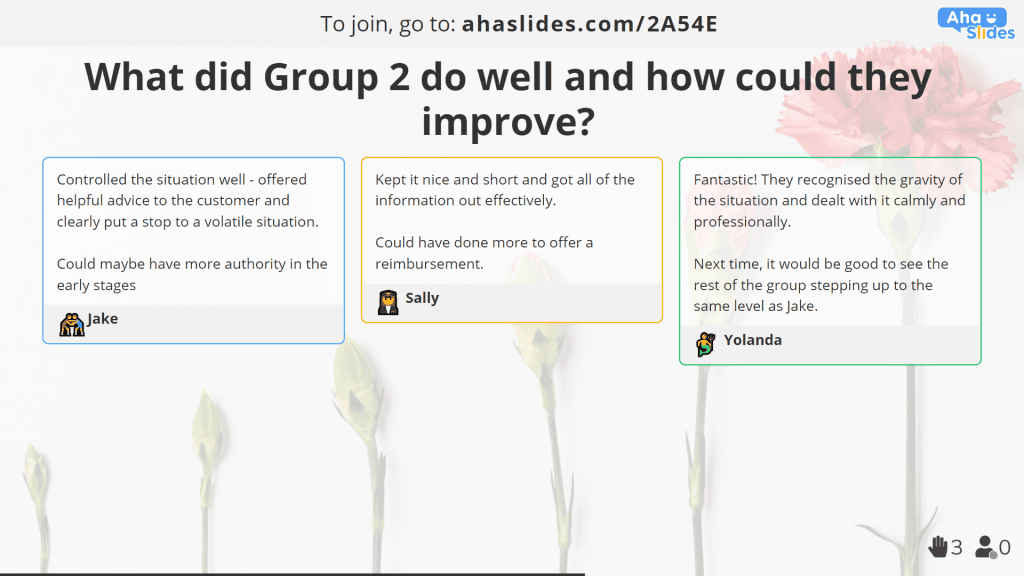الذكاء العقلي مقابل الذكاء العاطفي في القيادةأيهما أهم للقائد العظيم؟ اطلع على دليل AhaSlides الأفضل لعام ٢٠٢٤
كان هناك جدل مثير للجدل حول ما إذا كان القادة ذوو الذكاء العاطفي العالي أفضل في القيادة والإدارة من القادة ذوي الذكاء العقلي العالي.
بما أن العديد من القادة العظماء في العالم يتمتعون بمعدل ذكاء عالٍ، فإن هذا لا يضمن أن امتلاك معدل ذكاء دون ذكاء عاطفي يُسهم في قيادة ناجحة. إن فهم جوهر الذكاء العاطفي في القيادة يُساعد فريق الإدارة على اتخاذ الخيارات الصحيحة والقرارات الصائبة.
لن تركز المقالة على شرح مفهوم الذكاء العاطفي فحسب ، بل ستذهب إلى أبعد من ذلك لتعلم رؤى عميقة حول دور الذكاء العاطفي في القيادة وكيفية ممارسة هذه المهارة.
نظرة عامة
| من اخترع الذكاء العاطفي؟ | الدكتور دانيال جولمان |
| متى تم اختراع "الذكاء العاطفي"؟ | 1995 |
| من هو أول من استخدم مصطلح "الذكاء العاطفي"؟ | ماير جون دي. وبيتر سالوفي من جامعة ييل |
جدول المحتويات
- ما هو الذكاء العاطفي؟
- ما هي مهارات الذكاء العاطفي التي تجيدها؟
- لماذا يعتبر الذكاء العاطفي في القيادة مهمًا جدًا؟
- كيف تمارس الذكاء العاطفي في القيادة؟
- الوجبات السريعة الرئيسية
- الأسئلة الشائعة

مزيد من النصائح مع AhaSlides

هل تبحث عن أداة لإشراك فريقك؟
اجمع أعضاء فريقك من خلال اختبار ممتع على AhaSlides. قم بالتسجيل لأخذ اختبار مجاني من مكتبة قوالب AhaSlides!
🚀 احصل على مسابقة مجانية
ما هو الذكاء العاطفي؟
أصبحت فكرة الذكاء العاطفي شائعة الاستخدام من قبل دانيال جولمان في التسعينيات ولكن ظهرت لأول مرة في ورقة عام 1990 بقلم مايكل بيلدوش ، والتي تشير إلى أن شخصًا ما لديه القدرة على إدراك ومراقبة عواطفه ومشاعر الآخرين واستخدامها لقيادة تفكير وسلوك الآخرين.
أمثلة على القادة الأذكياء عاطفياً
- التعبير عن الانفتاح والاحترام والفضول والاستماع الفعال لقصص الآخرين ومشاعرهم دون الخوف من الإساءة إليهم
- تطوير شعور جماعي بالأهداف ، وخطة إستراتيجية لتحقيقها
- تحمل المسؤولية عن أفعالهم وأخطائهم
- توليد وتشجيع الحماس واليقين والتفاؤل وبناء الثقة والتعاون
- تقديم وجهات نظر متعددة لتحفيز التغييرات والابتكار في المنظمة
- بناء ثقافة تنظيمية متناسقة
- معرفة كيفية التحكم في مشاعرهم وخاصة الغضب أو خيبة الأمل
ما هي مهارات الذكاء العاطفي التي تجيدها؟
عند تقديم المقال "ما الذي يجعل من الإنسان قائدًا"، دانيال جولمان حدد الذكاء العاطفي في القيادة بخمسة عناصر موضحة بوضوح على النحو التالي:
# 1. الوعي الذاتي
إن إدراك مشاعرك وأسبابها هو الخطوة الأولى قبل أن تتمكن من إدراك مشاعر الآخرين. ويتعلق الأمر أيضًا بقدرتك على فهم نقاط قوتك وضعفك. عندما تكون في منصب قيادي، عليك أن تكون على دراية بأي من مشاعرك سيكون له تأثير إيجابي أو سلبي على موظفيك.
# 2. التنظيم الذاتي
التنظيم الذاتي يعني التحكم في عواطفك وتكييفها مع الظروف المتغيرة. وهو يتضمن القدرة على التعافي من الإحباط وعدم الرضا للتصرف بطريقة تتوافق مع قيمك. لا يستطيع القائد التحكم في الغضب أو الغضب بشكل مناسب، ولا يضمن فعالية الفريق. إنه يخشى ارتكاب الخطأ أكثر من تحفيزه لفعل الصواب. إنهما قصتان مختلفتان تمامًا.
# 3. تعاطف
لا يستطيع الكثير من القادة وضع أنفسهم مكان الآخرين، خاصةً عند اتخاذ القرارات، إذ عليهم إعطاء الأولوية لإنجاز المهام وأهداف المنظمة. القائد الذكي عاطفيًا يكون مدروسًا ومراعيًا لأي إجراءات تتخذها وأي قرار تتخذه لضمان عدم استبعاد أي فرد من فريقه أو حدوث أي مشكلة غير عادلة.
# 4. تحفيز
قال جون هانكوك: "إن أعظم مهارة في مجال الأعمال هي التوافق مع الآخرين والتأثير في تصرفاتهم". ولكن كيف نتوافق معهم ونؤثر فيهم؟ الدافع هو جوهر الذكاء العاطفي في القيادة. يتعلق الأمر برغبة قوية في تحقيق أهداف غامضة وواقعية، ليس فقط لأنفسنا، بل أيضًا لتشجيع مرؤوسينا على الانضمام إلينا. يجب على القائد أن يفهم ما يحفز موظفيه.
# 5. مهارات اجتماعية
تتعلق المهارات الاجتماعية بالتعامل مع الآخرين، أي إدارة العلاقات. ويبدو أن هذا صحيح تمامًا، إذ قال ديل كارنيجي: "عند التعامل مع الناس، تذكر أنك لا تتعامل مع كائنات منطقية، بل مع كائنات عاطفية". للمهارات الاجتماعية صلة وثيقة بالمتواصلين البارعين، وهم دائمًا خير مثال على السلوك والانضباط الذي يجب على أعضاء فريقهم اتباعه.

لماذا يعتبر الذكاء العاطفي في القيادة مهمًا جدًا؟
دور الذكاء العاطفي في القيادة لا يمكن إنكاره. يبدو أن الوقت مناسب للقادة والمديرين للاستفادة من الذكاء العاطفي لفعالية القيادة. لم يعد هناك عصر استخدام العقاب والسلطة لإجبار الآخرين على اتباع حكمك ، خاصة في قيادة الأعمال ، والتدريب التعليمي ، وصناعة الخدمات ، والمزيد.
هناك العديد من النماذج المثالية للقيادة الذكية عاطفياً في التاريخ والتي كان لها تأثير قوي على ملايين الأشخاص وحاولت إيجاد عالم أفضل مثل مارتن لوثر كينغ جونيور.
اشتهر بذكائه العاطفي العالي لتحفيز الناس وإلهامهم للانضمام إليه بالدفاع عن الحق والمساواة. وبصفته أحد أبرز الأمثلة على الذكاء العاطفي في القيادة، تواصل مارتن لوثر كينغ مع مستمعيه من خلال مشاركته القيم والرؤية المستقبلية ذاتها بمشاعره الأصيلة، ونقل التعاطف.
يشير الجانب المظلم للذكاء العاطفي في القيادة إلى استخدامه كأسلوب للتلاعب بتفكير الناس أو إثارة المشاعر السلبية لتحقيق أغراض ضارة، وهو ما ورد ذكره أيضًا في كتاب آدم غرانت. سيكون سلاحًا ذا حدين إذا لم يُستخدم بشكل صحيح.
من أبرز الأمثلة السلبية على استخدام الذكاء العاطفي في القيادة أدولف هتلر. سرعان ما أدرك قوة الذكاء العاطفي، فأقنع الناس بالتعبير عن مشاعرهم بذكاء، مما أدى إلى عبادة شخصية، ونتيجةً لذلك، "توقف أتباعه عن التفكير النقدي واكتفوا بالتعبير عن مشاعرهم".
كيف تمارس الذكاء العاطفي في القيادة؟
في كتاب "القيادة البدائية: الدافع الخفي للأداء المتميز"، قسّم المؤلفون أنماط القيادة العاطفية إلى ست فئات: الاستبدادية، والتدريبية، والانتماءية، والديمقراطية، وتحديد الإيقاع، والإكراه (دانيال جولمان، وريتشارد بوياتزيس، وآني ماكي، ٢٠٠١). ينبغي اختيار أنماط القيادة العاطفية بعناية، إذ لا أحد يعلم مدى تأثير كل نمط على مشاعر وحدسية الأشخاص الذين تقودهم.
فيما يلي 5 طرق لممارسة الذكاء العاطفي في القيادة:
# 1. مارس اليقظة
كن على علم بما تقوله واستخدام كلمتك. يمكن أن تساعد ممارسة التفكير بأكثر الطرق وعيًا وإدراكًا في إدارة مشاعرك والاستجابة لها. كما أنه يساعد على تقليل مشاعرك السلبية ويقل احتمال تعرضك للإرهاق أو الإرهاق. يمكنك قضاء بعض الوقت في كتابة دفتر يوميات أو التفكير في نشاطك في نهاية اليوم.
# 2. اقبل وتعلم من الملاحظات
يمكنك تجربة جلسة مفاجئة لتناول القهوة أو الوجبات الخفيفة لتتيح وقتًا للتحدث والاستماع إلى موظفيك، مما يعزز التواصل العاطفي. يمكنك أيضًا إجراء استطلاع رأي لمعرفة احتياجات موظفيك الحقيقية وما الذي يمكن أن يحفزهم. ستجد الكثير من المعلومات القيّمة بعد هذا النوع من المحادثات والاستطلاعات المعمقة. وكما ترى من القادة المشهورين ذوي الذكاء العاطفي العالي، فإن الردود الصادقة والفعالة هي أفضل الطرق للحصول على ملاحظات من فريقك. تقبّل ما تقوله الملاحظات، سواء كانت إيجابية أو سلبية، وتدرب على كبت ضغينتك أو حماسك عند رؤيتها. لا تدعها تؤثر على قرارك.

# 3. تعرف على لغات الجسد
لا غنى عن استثمار وقتك وجهدك في التعمق في عالم لغة الجسد. لا توجد طريقة أفضل للتعرف على مزاج الآخرين من النظر إلى لغة الجسد. فالإيماءات المحددة، ونبرة الصوت، والتحكم بالعين، كلها عوامل تكشف عن حقيقة تفكيرهم ومشاعرهم. إن تجاهل أي تفصيل في أفعالهم يساعدك على فهم مشاعرهم الحقيقية بشكل أفضل والاستجابة لها بسرعة وبشكل مناسب.
# 4. تعرف على الامتيازات والعقاب
إذا كنت تفكر في أي نوع من المكافآت أو العقوبة يعمل بشكل أفضل على تحفيز الموظفين ، ضع في اعتبارك أنك تصطاد عددًا أكبر من الذباب بالعسل أكثر مما تفعله بالخل. من الصحيح إلى حد ما أن العديد من الموظفين يحبون سماع المديح من مديرهم عندما يقومون بعمل رائع أو يكسبون إنجازًا ، وسيستمرون في الأداء بشكل أفضل.
يقال أن حوالي 58٪ من النجاح الوظيفي يعتمد على الذكاء العاطفي. العقوبة ضرورية في بعض الحالات ، خاصةً عندما تريد الحفاظ على المساواة والثقة ومنع النزاعات.
# 5. خذ دورة أو تدريب عبر الإنترنت
لن تعرف أبدًا كيفية حلها إذا لم تصادفها أبدًا. من الضروري الانضمام إلى دورات تدريبية أو دورات حول تحسين الذكاء العاطفي. يمكنك التفكير في التدريب الذي يمنحك فرصة للتفاعل مع الموظفين وممارسة سيناريوهات مرنة. يمكنك أيضًا تعلم طرق مختلفة لحل النزاعات أثناء الدورات التدريبية.
بالإضافة إلى ذلك ، يمكنك تصميم تدريب شامل على الذكاء العاطفي لموظفك من خلال أنشطة مختلفة لبناء الفريق لتغذية التعاطف وتعزيز فهم أفضل للآخرين. من خلال ذلك ، يمكنك الحصول على فرصة لمراقبة أفعالهم ومواقفهم وسلوكياتهم أثناء لعب اللعبة.
الوجبات السريعة الرئيسية
إذن أي نوع من القادة تريد أن تكون؟ في الأساس ، لا يوجد صواب أو خطأ تام في استخدام الذكاء العاطفي في القيادة لأن معظم الأشياء تعمل كوجهين لعملة واحدة. في السعي لتحقيق كل من الأهداف قصيرة المدى وطويلة المدى ، من الضروري أن يفكر القادة في تجهيز أنفسهم بمهارات الذكاء العاطفي.
بغض النظر عن نوع أسلوب القيادة الذي تختار ممارسته ، الإنهيارات أفضل الأدوات التعليمية والتدريبية بشكل مناسب لمساعدة القادة في تدريب وإشراك الموظفين لتحسين فعالية الفريق وتماسكه. محاولة الإنهيارات على الفور لتعزيز أداء فريقك.
الأسئلة الشائعة
ما هو الذكاء العاطفي؟
يشير الذكاء العاطفي (EI) إلى القدرة على إدراك مشاعر الفرد وفهمها وإدارتها، بالإضافة إلى التعامل مع مشاعر الآخرين والاستجابة لها بفعالية. ويشمل مجموعة من المهارات المتعلقة بالوعي العاطفي والتعاطف وضبط النفس والتفاعل الاجتماعي. ولذلك، يُعدّ هذا الذكاء مهارة بالغة الأهمية في المناصب القيادية.
كم عدد أنواع الذكاء العاطفي الموجودة؟
هناك خمس فئات مختلفة: الدافع الداخلي ، والتنظيم الذاتي ، والوعي الذاتي ، والتعاطف ، والوعي الاجتماعي.
ما هي المستويات الثلاثة للذكاء العاطفي؟
ثلاثة مستويات تشمل التابع والمستقل والتعاوني.








